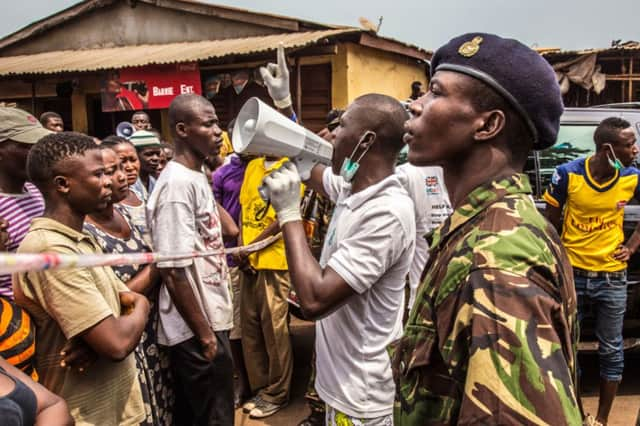Sierra Leone into lockdown in push to beat Ebola


As with a similar operation last year, thousands of teams will fan out around the country, knocking on doors to remind people how Ebola is spread and how to prevent it. In regions around the capital Freetown and in the north where flare-ups persist, health workers will also search for Ebola cases.
Alfred Palo Conteh, the head of Sierra Leone’s Ebola response, said a major goal is to fight complacency, more than a year after the outbreak was declared in West Africa.
Advertisement
Hide AdAdvertisement
Hide AdEbola has infected nearly 12,000 people in Sierra Leone, more than in any other country, and it has resorted to some of the most stringent measures to stop the disease. The September shutdown was thought to be the first time since the plague devastated Europe in the Middle Ages that such a dramatic step has been taken.
Recent weeks have seen a steep reduction in infections, according to the World Health Organisation (WHO). It is most worried about Guinea where the outbreak is driven by unrecorded cases. Liberia currently has only one patient in treatment.
Sierra Leone president Ernest Bai Koroma vows to do “whatever it takes” to eradicate the virus.
Starting yesterday at 6am Sierra Leoneans were asked to stay in their homes until Sunday evening. Markets, shops, restaurants and bars must shut. Muslims were allowed to attend prayers yesterday and Christians can go to services on Sunday, the start of Holy Week before Easter.
“We understand that people are tired and want to get back to their normal life, but we’re not there yet. It’s the final meters in the race,” said Roeland Monasch of Unicef.
The lockdown comes amidst some rare good news. According to official figures from the WHO, there were just 33 new confirmed cases last week – the lowest number since June 2014.
But with these falling figures there is danger of growing complacency, the government said.
This is one of the main reasons behind the lockdown – volunteers will remind people how to protect themselves against a virus that is still a real threat.
Advertisement
Hide AdAdvertisement
Hide AdThey will focus their efforts on northern and western areas where some infections still come as a surprise to officials. About 16 per cent of cases last week were not known Ebola contacts. Experts have criticised previous stay-at-homes as too heavy-handed. Concerns were raised that some people did not have access to food.
The hope is, a year after the outbreak was declared, such problems have been ironed out and this measure will bring the country closer to its goal of zero Ebola infections by April.
FOLLOW US
SCOTSMAN TABLET AND MOBILE APPS